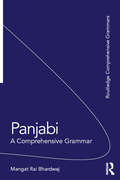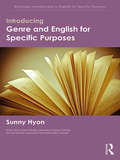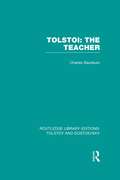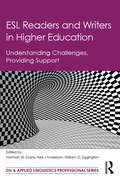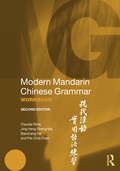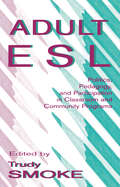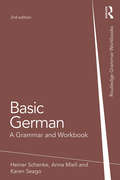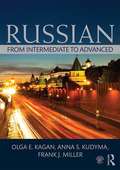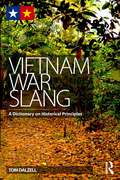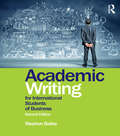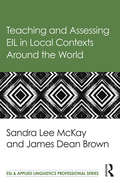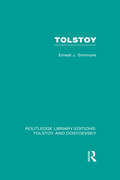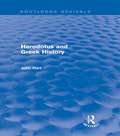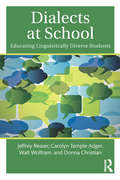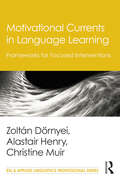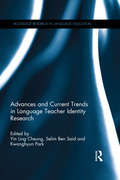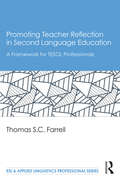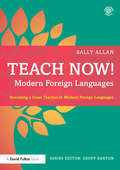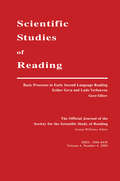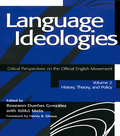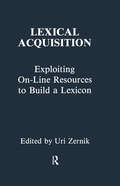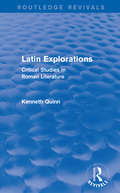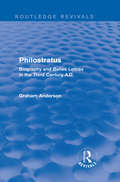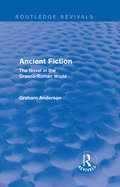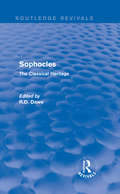- Table View
- List View
Panjabi: A Comprehensive Grammar (Routledge Comprehensive Grammars)
by Mangat BhardwajPanjabi: A Comprehensive Grammar is a complete reference guide to Panjabi grammar. It presents a fresh, accessible and thorough description of the language, concentrating on the real patterns of use in modern Panjabi. The book moves from the script and sound through morphology and word classes to a detailed analysis of sentence structures and semantic features. The volume is organized to promote a thorough understanding of Panjabi grammar. It offers a stimulating analysis of the complexities of the language, and provides full and clear explanations. Throughout, the emphasis is on Panjabi as used by present-day native speakers. An extensive index and numbered paragraphs provide readers with easy access to the information they require. Features include: detailed treatment of the common grammatical structures and parts of speech extensive exemplification particular attention to areas of confusion and difficulty Gurmukhi script and transliteration provided throughout additional chapter on the Shahmuki script Panjabi: A Comprehensive Grammar is an essential reference source for the learner and user of Panjabi. With clear and simple explanations it will remain the standard reference work for years to come for both learners and linguists alike. A Workbook and Reader to accompany this grammar can be downloaded from https://www.routledge.com/products/9781138793866. *Please note that, due to unforseen circumstances, the Workbook and Reader have been delayed.*
Introducing Genre and English for Specific Purposes (Routledge Introductions to English for Specific Purposes)
by Sunny HyonGenre analysis has become a key approach within the field of English for Specific Purposes and helps students understand particular language use patterns in target contexts. Introducing Genre and English for Specific Purposes provides an overview of how genre has been conceptualized and applied in ESP, as well as the features that distinguish ESP genre research and teaching from those of other genre schools. The macro and micro aspects of ESP genre-based pedagogy are also analysed and include: different possibilities for planning and designing an ESP genre-based course; the concrete, micro aspects of materials creation; and how genres can be learned through play. Introducing Genre and English for Specific Purposes is essential reading for students and pre-service teachers who are studying Genre, English for Specific Purposes or language teaching methodologies.
Tolstoi: The Teacher (Routledge Library Editions: Tolstoy and Dostoevsky)
by Charles-BaudouinThe author states here that Tolstoy was a great educator and his views on education were ingenious and profound. Despite being a great artist, Tolstoy also had pedagogic method and drew abundantly on the stores of science. The book looks at articles which Tolstoy wrote on education and childhood, comparing him frequently to Rousseau, and also outlines the influences of his travels which informed his knowledge of contemporary schooling. The conclusion considers the development of Tolstoy’s thought on teaching alongside the state of education at the time the book was first published, in 1923. This will be of interest for the educational historian as well as those interested in Tolstoy himself.
ESL Readers and Writers in Higher Education: Understanding Challenges, Providing Support (ESL & Applied Linguistics Professional Series)
by Norman W. Evans Neil J Anderson William G. EggingtonESL Readers and Writers in Higher Education describes the challenges ESL students in U.S. postsecondary institutions face when studying in a second language, and offers suggestions for how teachers, advisors, tutors, and institutions might provide support that meets the reading and writing needs of this very important student population. Because the ESL profession as a whole, including what professionals are doing in the classroom, sits under the umbrella of an institutional response to a language-related challenge, some solutions aimed at helping students achieve optimal proficiency lie outside of the classroom. As such, this book is based on the assertion that language development support is not the sole responsibility of language teachers. Everyone on campuses that hosts ESL students bears some responsibility for these students' language development. Chapters are therefore, intentionally adapted to appeal to a wide variety of readers from classroom teachers, and teachers in training, to admissions officers, academic advisors, and international student advisors.
Modern Mandarin Chinese Grammar Workbook (Modern Grammar Workbooks)
by Claudia Ross Baozhang He Pei-Chia Chen Jing-Heng Sheng MaModern Mandarin Chinese Grammar Workbook is a book of exercises and language tasks for all learners of Mandarin Chinese. Divided into two sections, the Workbook initially provides exercises based on essential grammatical structures, and moves on to practice everyday functions such as making introductions, apologizing and expressing needs. With an extensive answer key at the back to enable students to check on their progress, main features include: exercises at various levels of challenge for a broad range of learners cross-referencing to the related Modern Mandarin Chinese Grammar a comprehensive index to exercises alphabetically arranged in terms of structures, functions, and key Chinese structure vocabulary. This second edition also offers a revised and expanded selection of exercises including new task-based exercises. Modern Mandarin Chinese Grammar Workbook is ideal for all learners of Mandarin Chinese, from beginner to intermediate and advanced students. It can be used both independently and alongside the Modern Mandarin Chinese Grammar (978-0-415-82714-0), which is also published by Routledge.
Adult Esl: Politics, Pedagogy, and Participation in Classroom and Community Programs
by Trudy SmokeThe essays in this book focus on political strategies, pedagogical models, and community programs that enable adult ESL learners to become vital members of North American society. This is particularly important in our present time of contraction and downsizing in the education of non-native speakers. The authors represent a broad range of programs and perspectives, but they all have in common the goal of enabling both faculty and students to become full participants in our society and thereby to gain control over their futures. Readers of this book will develop an understanding of the ways in which innovative educators are creating strategies for maintaining language programs and services.
Basic German: A Grammar and Workbook (Routledge Grammar Workbooks)
by Heiner Schenke Anna Miell Karen SeagoBasic German: A Grammar and Workbook comprises an accessible reference grammar and related exercises in a single volume. The book introduces German people and culture through the medium of the language used today, covering the core material which students would expect to encounter in their first years of learning German. Each of the 29 units presents one or more related grammar topics, illustrated by examples which serve as models for the exercises that follow. These wide-ranging and varied exercises enable the student to master each grammar point thoroughly. Features include: • Clear grammatical explanations with examples in both English and German • Authentic language samples from a range of media • Checklists at the end of each unit to reinforce key points • Cross-referencing to other grammar chapters • Full exercise answer key • ‘Did you know?’ sections with extra learning tips on specific grammar points and insights into current usage of German • Glossary of grammatical terms The new edition has been thoroughly revised, including more varied exercises for practice, and grammar points have been reformulated to use a more learner-centred approach. Suitable for independent study and for class use, Basic German: A Grammar and Workbook is the ideal reference and practice book for beginners, as well as for students with some knowledge of the language. ?
Russian: From Intermediate to Advanced
by Olga E. Kagan Kudyma Anna Frank J. MillerRussian: From Intermediate to Advanced is a vibrant and modern course designed to help students achieve advanced proficiency in Russian. Offering a flexible modular approach structured around contemporary themes, the course further develops reading, listening, speaking, and writing skills while also expanding the student’s cultural literacy. Key features include: Structured chapters presenting a wide assortment of readings that include blogs, forums and surveys as well as opinion pieces and commentaries. Each text is accompanied by assignments with increasing levels of difficulty. Authentic and up-to-date readings, video and audio excerpts covering a range of relevant social and cultural topics, including Demography, Youth Culture, Politics and Society, Economics and Globalization. Video clips from news programs that are used not only to develop listening comprehension but also introduce students to contemporary Russian society. Particular attention to helping students acquire advanced vocabulary and the ability to converse, discuss and argue about issues with extended paragraph-length discourse. Special focus on the development of strong listening and reading comprehension skills, ensuring that students understand the ideas and supporting details in narrative and descriptive texts and connected discourse. A free companion website at http://www.russian.ucla.edu/AdvancedRussian/ offering student and instructor video and audio resources, sample syllabi and tests as well as additional materials. Written by a highly experienced author team that has co-authored the first year Russian textbook Beginner’s Russian (2010) and the second-year textbook V Puti (2005). Russian: From Intermediate to Advanced will be an essential resource for undergraduate students in their third and fourth year of Russian language study. It is also suitable for heritage learners of Russian who have mastered literacy and are familiar with the grammatical structure of Russian.
Vietnam War Slang: A Dictionary on Historical Principles
by Tom DalzellIn 2014, the US marks the 50th anniversary of the Gulf of Tonkin Resolution, the basis for the Johnson administration’s escalation of American military involvement in Southeast Asia and war against North Vietnam. Vietnam War Slang outlines the context behind the slang used by members of the United States Armed Forces during the Vietnam War. Troops facing and inflicting death display a high degree of linguistic creativity. Vietnam was the last American war fought by an army with conscripts, and their involuntary participation in the war added a dimension to the language. War has always been an incubator for slang; it is brutal, and brutality demands a vocabulary to describe what we don’t encounter in peacetime civilian life. Furthermore, such language serves to create an intense bond between comrades in the armed forces, helping them to support the heavy burdens of war. The troops in Vietnam faced the usual demands of war, as well as several that were unique to Vietnam – a murky political basis for the war, widespread corruption in the ruling government, untraditional guerilla warfare, an unpredictable civilian population in Vietnam, and a growing lack of popular support for the war back in the US. For all these reasons, the language of those who fought in Vietnam was a vivid reflection of life in wartime. Vietnam War Slang lays out the definitive record of the lexicon of Americans who fought in the Vietnam War. Assuming no prior knowledge, it presents around 2000 headwords, with each entry divided into sections giving parts of speech, definitions, glosses, the countries of origin, dates of earliest known citations, and citations. It will be an essential resource for Vietnam veterans and their families, students and readers of history, and anyone interested in the principles underpinning the development of slang.
Academic Writing for International Students of Business
by Stephen BaileyInternational students of Business or Economics often need to write essays and reports for exams and coursework, and this new, second edition of Academic Writing for International Students of Business has been completely revised and updated to help them succeed with these tasks. This book explains the academic writing process from start to finish, and practises all the key writing skills in the context of Business Studies. The book can be used either with a teacher or for self-study, and is clearly organised into four parts, with each divided into short units that contain examples, explanations and exercises for use in the classroom or for self-study: The Writing Process, from assessing sources to proofreading Elements of Writing, practising skills such as making comparisons Vocabulary for Writing, dealing with areas such as nouns and adjectives, adverbs and verbs, synonyms, prefixes and prepositions, in an academic context Writing Models, illustrating case studies, reports, longer essays and other key genres This is an up-to-date book that reflects the interests and issues of contemporary Business Studies, with revised exercises, updated reading texts and a new glossary to ensure accessibility and maximise usability. Students wanting to expand their academic potential will find this practical and easy-to-use book an invaluable guide to writing in English for their degree courses, and it will also help students planning a career with international companies or organisations, where proficiency in written English is a key skill. All aspects of writing clearly explained, with full glossary for reference Full range of practice exercises, with answer key included Use of authentic academic texts Fully updated, with sections on finding electronic sources and evaluating internet material
Teaching and Assessing EIL in Local Contexts Around the World (ESL & Applied Linguistics Professional Series)
by Sandra Lee Mckay James Dean BrownEnglish today is a global language embedded in a great variety of social contexts, resulting in linguistic and pedagogical variation. Taking a new look at the teaching and assessing of English as an international language (EIL), this text highlights overarching principles and provides specific strategies for responding to questions and challenges posed by the changing demographics of English language learners and users around the world. Teaching and Assessment in EIL Classrooms introduces an original, coherent framework in which needs analysis, pedagogical principles, and assessment are integrated describes variables that influence effective teaching and assessment and the characteristics of various EIL teachers and learners emphasizes that pedagogical and assessment decisions need to be based on the learning and teaching needs of each specific EIL context includes specific principles and strategies for teaching and assessing grammar, oral language, and literacy skills in EIL classrooms provides strategies for integrating computer-mediated language into EIL classrooms in ways that promote cross-cultural awareness, language development, and individualized learning Timely, accessible, and practical, this text for graduate and pre- and in-service courses on language teaching and assessment is at the forefront in providing valuable information and guidance for enabling principled and context-sensitive praxis in EIL classrooms worldwide.
Tolstoy (Routledge Library Editions: Tolstoy and Dostoevsky)
by Ernest Joseph SimmonsTolstoy’s fame as one of the world’s greatest novelists has never been in doubt, but the importance of his views on the social, moral and religious issues of his time is not so widely recognised. This study, first published in 1973, presents an introduction to the historical and cultural background of Tolstoy’s lifetime, then going on to consider the major events of his developing personality as a writer and reformer. As well as considering the famous novels and literary criticism, Simmons treats his educational theories and practice, famine relief work, spiritual crises and religious, social and moral beliefs, as reflected in controversial writings such as What I Believe, What Then Must We Do? and The Kingdom of God Is Within You. He also investigates Tolstoy’s involvement in government, war and revolution, and the relevance of his reformist views in the contemporary world.
Herodotus and Greek History (Routledge Revivals)
by John HartHerodotus has shaped our knowledge of life, religion, war and politics in ancient Greece immeasurably, as well as being one of the most entertaining of all Classical Greek authors: fascinating, perceptive, accessible and not at all pretentious. Herodotus and Greek History, first published in 1982, examines the themes and preoccupations which form the basis for Herodotus’ style of history. The Athenian nobility, important protagonists in the context of what we know of his sources; the human and divine forces, which Herodotus understood as influencing the course of history; and the concepts of character and motivation are all discussed. Herodotus’ treatment of religious belief and oracles, politics and war, and his portrayal of certain prominent individuals are specifically investigated. The final chapter situates Herodotus in his historical context. John Hart’s lucid, well-informed and lively discussion of Herodotus will be value to A-level candidates, school teachers, undergraduates, lecturers and curious non-classicists alike.
Dialects at School: Educating Linguistically Diverse Students
by Carolyn Temple Adger Donna Christian Jeffrey Reaser Walt WolframLike its predecessor, Dialects in Schools and Communities, this book illuminates major language-related issues that educational practitioners confront, such as responding to dialect related features in students’ speech and writing, teaching Standard English, teaching students about dialects, and distinguishing dialect difference from language disorders. It approaches these issues from a practical perspective rooted in sociolinguistic research, with a focus on the research base for accommodating dialect differences in schools. Expanded coverage includes research on teaching and learning and attention to English language learners. All chapters include essential information about language variation, language attitudes, and principles of handling dialect differences in schools; classroom-based samples illustrating the application of these principles; and an annotated resources list for further reading. The text is supported by a Companion Website (www.routledge.com/cw/Reaser) providing additional resources including activities, discussion questions, and audio/visual enhancements that illustrate important information and/or pedagogical approaches. Comprehensive and authoritative, Dialects at School reflects both the relevant research bases in linguistics and education and educational practices concerning language variation. The problems and examples included are authentic, coming from the authors’ own research, observations and interactions in public school classrooms, and feedback in workshops. Highlights include chapters on oral language and reading and writing in dialectally diverse classrooms, as well as a chapter on language awareness for students, offering a clear and compelling overview of how teachers can inspire students to learn more about language variation, including their own community language patterns. An inventory of dialect features in the Appendix organizes and expands on the structural descriptions presented in the chapters.
Motivational Currents in Language Learning: Frameworks for Focused Interventions (ESL & Applied Linguistics Professional Series)
by Zoltán Dörnyei Alastair Henry Christine MuirBuilding on Zoltán Dörnyei’s authoritative work in the field of learner motivation, this book introduces a new conceptualization—Directed Motivational Currents (DMCs)—and sets out the defining aspects of what they are, what they are not, and how they are related to language learning motivation. Going beyond focused behavior in a single activity, DMCs concern intensive long-term motivation. The distinctive feature of the theory is that it views motivation not simply as a springboard for action but also as a uniquely self-renewing and sustainable process. It is this energizing capacity which distinguishes DMCs from almost every other motivational construct described in the research literature. Motivational Currents in Language Learning offers new insights, valuable both to motivation researchers and classroom practitioners. The accessible style, along with plentiful illustrations and practical suggestions for promoting sustained learning, invite readers to think about motivation in a different way. Highly relevant for language teachers, teachers-in-training, teacher educators, and researchers in TESOL and applied linguistics, the book explains how the DMC construct can be integrated into course structures and teaching methodologies, and encourages teachers to try out novel methods for harnessing motivational power in classroom settings.
Advances and Current Trends in Language Teacher Identity Research (Routledge Research in Language Education)
by Selim Ben Said Yin Ling Cheung Kwanghyun ParkThis book presents the latest research on understanding language teacher identity and development for both novice and experienced researchers and educators, and introduces non-experts in language teacher education to key topics in teacher identity research. It covers a wide range of backgrounds, themes, and subjects pertaining to language teacher identity and development. Some of these include the effects of apprenticeship in doctoral training on novice teacher identity; the impacts of mid-career redundancy on the professional identities of teachers; challenges faced by teachers in the construction of their professional identities; the emerging professional identity of pre-service teachers; teacher identity development of beginning teachers; the role of emotions in the professional identities of non-native English speaking teachers; the negotiation of professional identities by female academics. Advances and Current Trends in Language Teacher Identity Research will appeal to academics in ELT/TESOL/applied linguistics. It will also be useful to those who are non-experts in language teacher education, yet still need to know about theories and recent advances in the area due to varying reasons including their affiliation to a teacher training institute; needs to participate in projects on language teacher education; and teaching a course for pre-service and in-service language teachers.
Promoting Teacher Reflection in Second Language Education: A Framework for TESOL Professionals (ESL & Applied Linguistics Professional Series)
by Thomas S. FarrellTaking the concept and the practice of reflective teaching forward, this book introduces a well-structured, flexible framework for use by teachers at all levels of development, from pre-service to novice to the most experienced. The framework outlines five levels of reflective practice—Philosophy; Principles; Theory-of-Practice; Practice; Beyond Practice—and provides specific techniques for teachers to implement each level of reflection in their work. Designed to allow readers to take either a deductive approach, moving from theory-into-practice, or an inductive approach where they start from a practice-into-theory position, the framework can be used by teachers alone, in pairs, or in a group.
Teach Now! Modern Foreign Languages: Becoming a Great Teacher of Modern Foreign Languages (Teach Now!)
by Sally AllanBeing taught by a great teacher is one of the great privileges of life. Teach Now! is an exciting new series that opens up the secrets of great teachers and, step-by-step, helps trainees to build the skills and confidence they need to become first-rate classroom practitioners. Written by a highly-skilled practitioner, this practical, classroom-focused guide contains all the support you need to become a great modern foreign languages teacher. Combining a grounded, modern rationale for learning and teaching with highly practical training approaches, the book guides you through all the different aspects of MFL teaching offering clear, straightforward advice on classroom practice, lesson planning and working in schools. Teaching and learning, planning, assessment and behaviour management are all covered in detail, with a host of carefully chosen examples used to demonstrate good practice. There are also chapters on the essentials of the MFL curriculum, pedagogical techniques, strategies to engage students in language learning, and how to succeed in observations and interviews. Throughout the book, there is a great selection of ready-to-use activities, approaches and techniques which will help put you on the fast track to success in the classroom. Covering everything you need to know, this book is your essential guide as you start your exciting and rewarding career as an outstanding MFL teacher.
Basic Processes in Early Second Language Reading: A Special Issue of scientific Studies of Reading
by Esther Geva Ludo VerhoevenThe four articles in this issue represent recent developments in the study of basic processes in L2 reading at the primary level. The research reported reflects the array of theoretical and instructional issues targeted currently by researchers who wish to understand L2 reading development in young children. Ultimately, this research should be used to help policymakers and educators make better informed decisions about how L2 literacy instruction can be enhanced across various sociocultural and linguistic boundaries.
Language Ideologies: Critical Perspectives on the Official English Movement, Volume II: History, Theory, and Policy
by Roseann Dueñas González Ildikó MelisFirst published in 2001. Routledge is an imprint of Taylor & Francis, an informa company.
Lexical Acquisition: Exploiting On-line Resources To Build A Lexicon
by Uri ZernikOn-line information -- and free text in particular -- has emerged as a major, yet unexploited, resource available in raw form. Available, but not accessible. The lexicon provides the major key for enabling accessibility to on-line text. The expert contributors to this book explore the range of possibilities for the generation of extensive lexicons. In so doing, they investigate the use of existing on-line dictionaries and thesauri, and explain how lexicons can be acquired from the corpus -- the text under investigation -- itself. Leading researchers in four related fields offer the latest investigations: computational linguists cover the natural language processing aspect; statisticians point out the issues involved in the use of massive data; experts discuss the limitations of current technology; and lexicographers share their experience in the design of the traditional dictionaries.
Latin Explorations: Critical Studies in Roman Literature (Routledge Revivals)
by Kenneth QuinnLatin Explorations, first published in 1963, offers a fresh approach to Roman poetry from Catullus to Ovid. Traditionally, the period is divided for specialist studies – Lyric, Epic and Elegy. In each of them, techniques of interpretation prevail, isolated from contemporary ideas about poetry and dominated by barriers between ‘textual’, ‘exegetical’ and ‘aesthetic’ criticism. Kenneth Quinn discerns in Roman poetry of this period the adolescence, maturity and decay of a single coherent tradition whose internal unity surpasses differences of form. His argument attempts to reverse the dissociation of purely academic research from appreciative criticism, whilst also incorporating the work of textual scholars. Each chapter is supported by a detailed analysis of the texts: nearly 700 lines of poetry are discussed and translated. Latin Explorations will be of significant value not only to students of the Classics, but also to the ‘Latinless’ general reader who is interested in Roman literature.
Philostratus: Biography and Belles Lettres in the Third Century A.D. (Routledge Revivals)
by Graham AndersonThis study of Philostratus , first published in 1986, presents the Greek biographer’s treatment of both sophists and holy men in the social and intellectual life of the early Roman Empire, which also displays his own distinctive literary personality as a superficial dilettante and an engrossing snob. Through him we gain a glimpse of the rhetorical schools and their rivalries, as well as a bizarre portrayal of the celebrated first-century holy man Apollonius of Tyana, long loathed by his later Christian press as a Pagan Christ. Rarely does a biographer’s reputation revolve round the charge that he forged his principal source. Graham Anderson’s account produces new evidence which supports Philostratus’ credibility, but it also extends the charges of ignorance and bias in his handling of fellow-sophists. Philostratus is intended for any reader interested in the social, cultural and literary history of the Roman Empire as well as the professional classicist.
Ancient Fiction: The Novel in the Graeco-Roman World (Routledge Revivals)
by Graham AndersonA number of ancient novelists were skilful storytellers and resourceful literary artists, and their works are often carefully individualised presentations of an ancient and distinguished heritage. Ancient Fiction, first published in 1984, examines the tales retold by these novelists in light of more recently discovered Near Eastern texts, and in this way offers a tentative solution to Rohde’s celebrated problem about the origins of the Greek novel. Among the surprises that emerge are an ancient stratum of the Arabian Nights and a possible Tristan-Romance, as well as an animal Satyricon and a human Golden Ass. This new framework is, however, incidental to an examination of the achievements of ancient novelists in their own right. In presenting character, structuring narrative, imposing a veneer of sophistication or contriving a religious ethos, these writers demonstrate that their work is worthy of sympathetic study, rather dismissal as the pulp fiction of the ancient world.
Sophocles: The Classical Heritage (Routledge Revivals)
by Roger DaweSophocles: The Classical Heritage, first published in 1996, contains a diverse collection of reflection, ranging from the 16th century to the 20th, on one of the three great Attic tragedians, the author of perhaps the most famous play of all time. With the entire notion of ‘Western culture’ under duress, the need to establish continuity from antiquity to modernity is as pressing as ever. Each essay, selected by Professor Dawe, explores a theme or concept derived from the tragic vision of the Sophoclean universe which is still of relevance today. An enormous range of topics is investigated, in a variety of modes and styles: the linguistic challenges of translation, the psychology of Sigmund Freud, Enlightenment critiques, the history of performance conventions, dramatic structure and technique, and issues facing the modern director. Overall, Professor Dawe offers a staggering selection of responses, which cumulatively demonstrate the continuing importance and fascination of Sophocles’ legacy.
